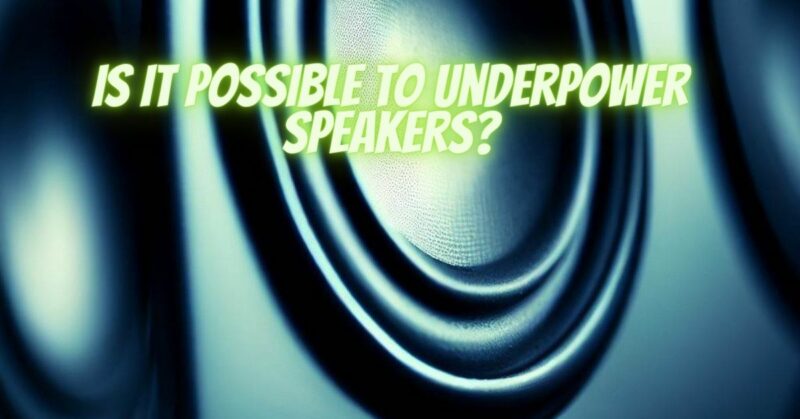Yes, it is possible to underpower speakers. When speakers are not getting enough power, they can’t produce the full range of frequencies that they are designed to reproduce. This can lead to a sound that is muffled, distorted, or tinny.
Here are some of the things that can happen when speakers are underpowered:
- Clipping: Clipping is a type of distortion that occurs when the amplifier is unable to provide enough power to the speakers to reproduce the audio signal accurately. This can cause the speakers to produce unwanted sounds, such as buzzing or crackling.
- Lack of bass: Speakers need a certain amount of power to produce deep bass frequencies. If the speakers are not getting enough power, they may not be able to produce these frequencies at all.
- Muddy sound: When speakers are not getting enough power, they may not be able to reproduce the different frequencies of sound cleanly. This can lead to a muddy or unclear sound.
- Tinny sound: When speakers are not getting enough power, they may not be able to reproduce the high frequencies of sound cleanly. This can lead to a tinny or harsh sound.
To avoid these problems, it is important to match the speakers to the amplifier. The amplifier should be able to provide enough power to the speakers to reproduce the audio signal accurately.
Here are some tips for matching speakers and amplifiers:
- Read the speaker specifications: Before you buy an amplifier, be sure to read the speaker specifications. This will tell you how much power the speakers need.
- Look for an amplifier with a high power rating: The power rating of an amplifier is the maximum amount of power that it can provide. A higher power rating means that the amplifier can provide more power to the speakers.
- Try out different amplifiers: If possible, try out different amplifiers with your speakers before you buy one. This will help you to find an amplifier that sounds good with your speakers.
By following these tips, you can help to ensure that your speakers sound their best.
Here are some additional things to keep in mind when considering whether to underpower or overpower speakers:
- Overpowering: Overpowering speakers can also cause problems. When speakers are getting too much power, they can be damaged. This can happen if the speakers are not designed to handle the power or if the amplifier is not properly set up.
- Speaker sensitivity: The sensitivity of a speaker is a measure of how much sound pressure it produces for a given amount of power. A speaker with high sensitivity will require less power to produce the same sound pressure as a speaker with low sensitivity.
- Impedance: The impedance of a speaker is a measure of its resistance to electrical current. Speakers with different impedances need to be matched to amplifiers with the same impedance.
By understanding these factors, you can better determine how much power you need to provide to your speakers.


